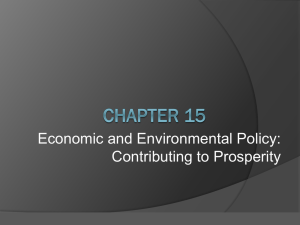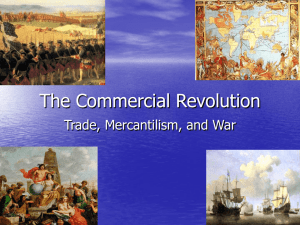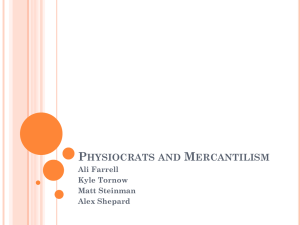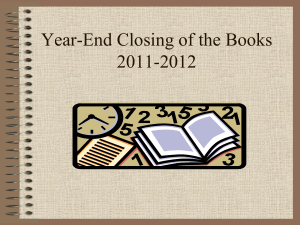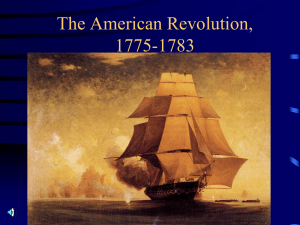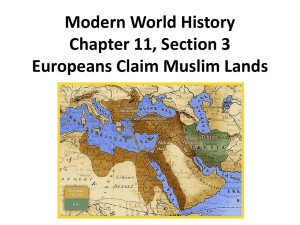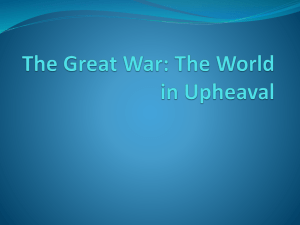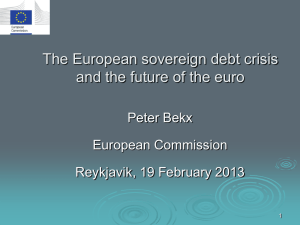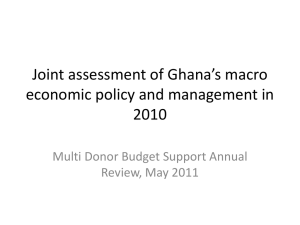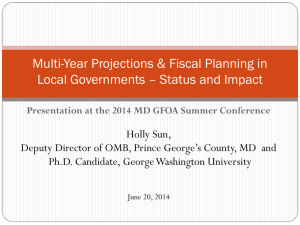2 - El Corte Inglés
advertisement
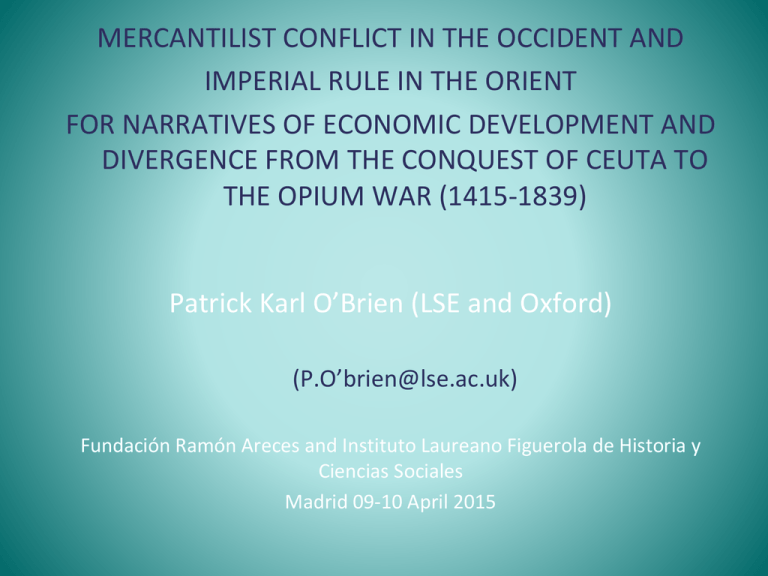
MERCANTILIST CONFLICT IN THE OCCIDENT AND IMPERIAL RULE IN THE ORIENT FOR NARRATIVES OF ECONOMIC DEVELOPMENT AND DIVERGENCE FROM THE CONQUEST OF CEUTA TO THE OPIUM WAR (1415-1839) Patrick Karl O’Brien (LSE and Oxford) (P.O’brien@lse.ac.uk) Fundación Ramón Areces and Instituto Laureano Figuerola de Historia y Ciencias Sociales Madrid 09-10 April 2015 AN ANALYTICAL NARRATIVE IN FOUR PARTS 1. Context, Theory and Historiography for a Mega Question on connexions between Mercantilist Warfare and Economic Progress in a Global History 2. Mercantilism, Geopolitics and the Fiscal Basis for State formation in Britain in Western Europe 3. Contrasts with three Asian Empires (Ming-Qing, Mughal and Ottoman) and their Fiscal, Financial and Monetary Systems 4. Some Negotiable Conclusions for Debates in Global History on War, State Formation and Economic Growth . PART 1: CONTEXT • For several decades “new” institutional economics has been engaged in restoring institutions to the place they occupied in writings from the German historical school. It has formulated a conceptual vocabulary; promoted the production of case studies and encouraged the construction of dubious “coefficients of significance” for variations in property rights, transactions costs, legal arrangements and other institutional variables behind observed differences in the performance of pre-modern Eurasian and American economies • But this research programme continues to lack anything approximating to a “foundational theory” for the hegemonic institution behind all other subordinate institutions – namely a theory concerned with the formation of developmental states • An economically efficient state can be recognized retrospectively as one that provided the external security and internal stability required for the establishment and maintenance of institutions, laws and cultures that promoted economic development • Latterly modern economists have recognised that the historical evolution of state capacities is highly correlated to current levels of GDP per capita. That capacity was essentially fiscal and came to higher levels of efficiencly through engagements in geopolitical warfare “In peace the progress of knowledge and industry is accelerated by the emulation of so many active rivals; in war the European forces are exercised by temperate and indecisive outcomes” (Edward Gibbon) • The concerns of pre-modern European states were not, however with economic development, but with external security, internal stability, dynastic survival and the centralization of power in contexts of: persistent geopolitical and mercantilist warfare; as well as conflicts with warlords, aristocrats, urban oligarchies, ecclesiastical authorities, rebellious peasants, disaffected proletarians and other centrifugal forces embodied in structures of local power contained within their contested frontiers • What political historians have published about state formation across Eurasia over the centuries that preceded the French and Industrial Revolutions and the Great Divergence are analyses of forces working more or less effectively for the centralization of authority over historically “conglomerated” polities that differed enormously in: territorial extent, geographical diversity, ethnic, cultural and religious composition. They have observed “processes of coercion, co-option and collaboration – evolving, failing and succeeding over the centuries (from 1415-1815) • Historians have also recognized that the technologies, flows of information and organizational capacities available to states for the regularized implementation, monitoring and auditing of central policies remained primitive and became less and less effective as distance from the centres of power increased • Neither history nor social science offers much by way of general theoretical insights into factors and processes promoting economically successful trajectories for state formation. Historians who remain sceptical about “enlightenment correlations” between “constitutions for liberty” and “constitutions for economic progress” have looked for heuristic insights that might be exposed, by way of “reciprocal comparisons” between states and states formation both in the west and latterly between the occident and the orient • Within this (Marc Bloch’s) paradigm for historical research they continue to explore a traditional (and possibly Euro-centered) hypothesis, namely that the firms, farms, investors, entrepreneurs and innovators, operating within Europe’s mercantilist order and ideology for state formation derived “unintended advantages” from that regime, compared to their counterparts operating within imperial frameworks for economic activity maintained by oriental empires to the east • But how should historians proceed to confront this Weberian hypothesis which has already attracted niaive answers from many economists including Acemoglu and Robinson (Why Nations Fail: The Origins of Power, Prosperity and Poverty (2012)). My approach has been to formulate hypotheses based upon the vast bibliography of scholarly literature on state formation in the west; to explain why Britain can be represented as the paradigmn case for successful mercantilism and to offer negotiable explanations for Europe’s delayed and Asia’s retarded transitions to industrial market economies • Following Schmoller and Schumpter my approach can be read as geopolitical and fiscal reductionism. But let’s see where it takes us? PART 2. 1: MERCANTILISM, GEOPOLITICS AND THE FISCAL BASIS FOR STATE FORMATION IN BRITAIN COMPARED TO ITS EUROPEAN RIVALS: • In 1815 at the close of 23 years of warfare against Revolutionary and Napoleonic France, the monarchy along with the aristocratic and plutocratic elites in charge of governing the, by then, United Kingdom of England, Wales, Scotland and Ireland, offered their deferential subjects: superior standards of external security, internal stability, protection for property rights, support for traditional hierarchy and authority, legal frameworks for the extension and integration of markets, encouragement for technical and business innovation and, above all, more extensive and better protected access to imperial and other overseas markets than any other state in the world. • Question: When, how and why did a small island realm move on to a historical trajectory that culminated in a proto-version of geopolitical hegemony and a precocious transition to an industrial market economy? I will use graphs to support some answers. Figure 1. Trends in Total Tax Receipts 1490-1820 (expressed Nine in year Moving Averages in £100.000 at constant prices of 1451-75) “Public finances are one of the best starting points for an investigation of Society. The spirit of the people, its cultural level, the deeds its policy may prepare – all this and more is written in fiscal history” (Joseph Schumpeter) Figure 2: Debt Servicing Ratios 1688-1814 (percentage of total tax revenues received by the state) Figure 3. Trends in Expenditures on the Royal Navy (constant prices of 1660) Figure 4. Expenditures on the Royal Navy Compared to Conjectures for GDFCF, 1600-1815 Figure 5. Sizes of the Royal and Rival Navies (displacement tonnage 000s) 800 700 England 600 500 400 France 300 200 Spain 100 Netherlands 1815 1800 1785 1770 1755 1740 1725 1710 1695 1680 1665 1650 1635 1620 1605 1590 1575 1560 1545 1530 1515 1500 0 Explaining trends • For the sake of argument I propose to attach numbers in order to rank the auto-correlated list of “instrumental variables” behind these figures for governmental income and expenditures that have been presented here as proxies for long run changes in the role of the state. They are, I assert, as plausible as any of the coefficients “manufactured” by the Acemoglu and other Schools of Technometrics. Thus, and in narrative histories of British state formation historians with scholarship that commands respect attribute varying degrees of significance to following lists of factors that over the long run promoted the formation of a state that became more powerful and effective for the promotion of economic growth than any other pre-modern state. • Distant medieval origins (0.0) • Withdrawal from imperial warfare on the mainland in 1453 (0.1) • Low and relatively cheap levels of involvement in the Reformation and religious warfare (0.1) • Civil War and its aftermath which included: the reconstruction of the fiscal system; a sharp and permanent uplift in expenditures on naval power; the suppression of Catholic and Celtic threats to stability; aggressive mercantilism; support for science; the re-grouping of an aristocratic and plutocratic consensus around the defence of property rights and privilege (0.3) • Further reforms to the structure and administration of the fiscal system and aggression against the Dutch under Stuart monarchs 1660-88 (0.1) • The Glorious Revolution / Dutch coup d’état (0.0) • Parliamentary sovereignty and budgetary procedures (0.0) • The financial revolution or consolidation of a national debt (0.1) • Mercantilism and the Royal Navy (0.3) “The essence of the system lies not in some doctrine of money or the balance of trade; not in tariff barriers or protective duties, or navigation laws; but in something far greater: namely in the total transformation of society and its organizations as well as of the state and its institutions, in the replacing of a local and territorial economy by that of the national state” (Gustav Schmoller) • “Mercantilism” (policies for trade and growth at which the British excelled) can be defined as a common strategy pursued by all European powers. For centuries western states remained preoccupied with: power over profit; focussed upon gains from a positive balance of trade and committed to maximizing the direct benefits and externalities embodied in exports and strategic imports, particularly bullion and taxable luxuries • Given that liberal trade counterfactuals were simply anachronistic for any pre-industrial state to pursue adherence to policies recommended by mercantilists provided western economies and their ruling elites with a range of advantages for the promotion of economic growth including: a) an enlarged basis and potential to widen and deepen fiscal demands from centralizing states b) bullion reserves for the rapid mobilization of armies and navies c) the expansion and agglomeration of economic activity in maritime cities – Europe’s “pôles de croissance” (pace Braudel and the World Systems School of Historical Sociology) and as modelled by theories of network technologies and gains from urban agglomeration d) metallic bases for the expansion of money supplies, along with opportunities for financial intermediation and the growth of markets for capital and credit accessible to states and private enterprise alike e) raw materials and manufactures from overseas upon which programmes of import substitution were built • In general although the persistence of geopolitical rivalry “crowded out” some potential for greater gains from trade, higher rates of growth and earlier transitions to industrial market economies: mercantilism (the dominant ideology of western capitalism): a) promoted persistent, more intensive and costly bouts of warfare which led to pressures for fiscal centralization to fund more expensive wars and to higher levels of urbanisation with agglomerative and demographic externalities for economic growth b) facilitated “exit and voice” c) promoted “proto-globalization” and expanded opportunities to reap gains from trade, particularly for the maritime regions and smaller economies of the west d) led after 1815 to the emergence of one hegemonic naval power (the UK) that reduced the risks, espoused the cause and diffused conditions for a liberal international economic order PART 2: 2 : BRITAIN AND ITS EUROPEAN RIVALS • The Question: If the economic history of Britain between 1651-1815 continues to be represented as Europe’s paradigm case of successful mercantilism during this final phase of mercantilism, Marc Bloch’s recommendations for reciprocal comparisons lead logically to an inquiry as to why the realm’s leading rivals failed to countervail a small island state committed to seizing an inordinate share of the increasing gains from trade and imperialism from a world economy undergoing proto-globalization. • Detailed answers would involve close engagement with the complex geopolitical histories of France, Spain, Portugal, Venice, The Netherlands, Denmark and other contenders for these gains. My research and writings have concentrated on exposing and accounting for clear contrasts with Britain in the restricted access that major European states had to the fiscal, financial and other resources required for: a) the consolidation of their claims to sovereignty b) the maintenance of stability and internal order c) external security d) and above all for profitable engagements in mercantilist competition and warfare with Britain maturing into a naval superpower Figure 6: Tax decennial averages) 2500 2000 France Spain Russia Dutch Rp Venice England Austria Holland Ottoman 1500 1000 500 0 1500-09 1550-59 1600-09 1650-59 1700-09 1750-59 23 Figure 7: Per Capita Tax Revenues Delivered to Governments (expressed as shaRevenues Received by Central Governments (tons of silver – res of daily wages of unskilled construction workers employed in capital cities) 35 30 25 France England Austria Holland Venice Ottoman Spain Russia Dutch Rp 20 15 10 5 24 0 1500-09 1550-59 1600-09 1650-59 1700-09 1750-59 1780-89 Figure 8: Total Revenues Received by Central Governments (expressed as shares (%s) of conjectures for GDP) 25 20 France England Austria Holland Ottoman Spain Russia Dutch Rp 15 10 5 0 1500 1550 1600 1650 1700 1750 1780 25 Contrasts Between Britain and Europe: The data to validate contrasts has been under collection and review by networks of economic historians. The statistics now available suggests that by 1659 their fiscal capacities to access and collect taxes in order to fund expenditures and service loans for defence and aggression had been exhausted by warfare and had run into diminishing returns because: a) Absolutist versus democratic states b) Political resistance to universal and centrally controlled systems of taxation remained far stronger among the “confederated” polities on the mainland c) Shares of taxes collected actually received by states were significantly lower on the continent d) In short the island’s short-lived Republican regime showed Britain possessed political, fiscal, natural, naval and other comparative advantages to realise the potential from an under utilized tax base to become a hegemonic geoplolitcal and economic power. e) Fiscal centralization comes to mainland Europe in the wake of the Revolutionary and Napoleonic Wars. The shift is exogenous. Control of expenditure emerged gradually over the 19th century again for exogenous political reasons. PART 3: WIDER RECIPROCAL COMPARISONS: European States and Asian Empires in a Mercantilist and Globalising Economy • The traditional Eurocentric discourse about oriental despotism compared to occidental democracy has been degraded. Global historians are now moving on to explore the hypotheses that prioritize functions over political forms. They begin with the recent quantified observation that from a euro-centered perspective states ruling over Oriental empires lacked command over anything approximating to sufficient revenues from taxation to: a) obtain access to loans and credits and thereby extend possibilities for financial intermediation and more elastic supplies of standardized money b) to fund investments required for levels and wider ranges of public goods that could counterfactually have promoted Smithian growth and Schumpterian increasing returns; c) to realize a greater share of the gains from protoglobalization accruing in overwhelming proportion to the maritime powers and economies of Europe from commerce and colonialism in Asia, Africa and the Americas d) to actively encourage urbanization and structural change PART 4 : NEGOTIABLE CONCLUSIONS • In conclusion A plausible conjecture has appeared on the agenda for global history for statistical research and historical interpretation. It restores geopolitics and states to a rank of prominence in narratives of divergence. The hypothesis under exploration is that western states (led by Britain) succeeded in centralizing command over their sovereign revenues more effectively and earlier than the rulers and bureaucracies in charge of imperial fiscal systems in west, south and east of Asia • That path-dependant trajectory could mature into a key, if not the key narratives and models of divergence. As the Godfather of global history, Marshall Hodgson observed fifty odd years ago “without the cumulative history of the whole Afro-Eurasian oikumene of which the occident has been an integral part, the western transmutation would be almost inexplicable”. • When they read more widely and deeply into the pre-modern histories of states run by Mughal, Safavid, Ottoman and Ming-Qing dynasties, what global historians have come to recognise is not the autocratic predators of western liberal mythology but desperate states attempting to provide the public goods for polities that became simply too extensive and heterogeneous to survive or too weak to promote effective and earlier transitions to modern economic growth. (pace China and the Ottoman Empire • With such contrasts between states and polities divergence became inevitable. (vide magnus opus of Victor Lieberman, Strange Parallels: Southeast Asia in Global Context c. 800-1830, vol. 2: Mainland Mirrors: Europe, Japan, China, South Asia and the Islands (Cambridge, 2009) and B. Yun Casalilla and P. O’Brien with F. Comin (eds.), The Rise of Fiscal States: A Global History (Cambridge, 2011)
